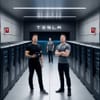Tesla has shut down its in-house Dojo supercomputer project, a significant shift in its artificial intelligence strategy. The Dojo supercomputer was designed to process vast amounts of video data collected by Tesla's global vehicle fleet to accelerate the development of its Full Self-Driving (FSD) software and robotics capabilities. However, the project reportedly struggled to deliver anticipated performance gains compared to established AI infrastructure providers like Nvidia.
The shutdown is attributed to technical difficulties and hardware complexities, making it less competitive. Maintaining a bespoke supercomputer was also costly, and Tesla opted for a more pragmatic approach. The company plans to partner with industry leaders like Nvidia, AMD, and Samsung for AI compute power and chip manufacturing.
Tesla will focus on its AI5 and AI6 chips, designed for inference and training, with manufacturing supported by a $16.5 billion deal with Samsung. Additionally, the company is developing a new AI training supercluster, Cortex, at its Austin headquarters, which will be powered by over 100,000 Nvidia H100 and H200 accelerators. This shift indicates Tesla's increased reliance on external partners to leverage their expertise and scale, accelerating development timelines and reducing costs.
By abandoning the Dojo project, Tesla is adapting its AI strategy to better align with industry trends and optimize its resources. The company's decision to focus on its core strengths and partner with established players in the AI infrastructure space is expected to drive innovation and growth in the electric vehicle and autonomous driving sectors.


